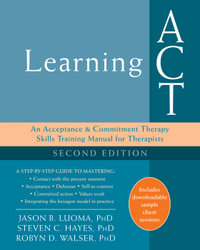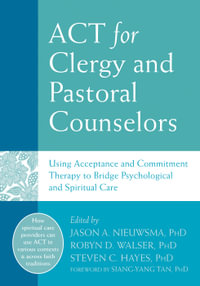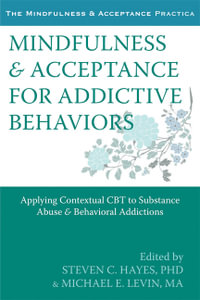Edited by Steven C. Hayes and Stefan G. Hofmann, and based on the new training standards developed by the Inter-Organizational Task Force on Cognitive and Behavioral Psychology Doctoral Education, this groundbreaking textbook presents the core competencies of cognitive behavioral therapy (CBT) in an innovative, practically applicable way, with contributions from some of the luminaries in the field of behavioral science.
CBT is one of the most proven-effective and widely used forms of psychotherapy today. But while there are plenty of books that provide an overview of CBT, this is the first to present the newest recommendations set forth by a special task force of the Association for Behavioral and Cognitive Therapies—and that focuses on the application of these interventions based on a variety of approaches for doctoral-level education and training. Starting with an exploration of the science and theoretical foundations of CBT, then moving into a thorough presentation of the clinical processes, this book constitutes an accessible, comprehensive guide to grasping and using even the most difficult competencies.
Each chapter of Process-Based CBT is written by a leading authority in that field, and their combined expertise presents the best of behavior therapy and analysis, cognitive therapy, and the acceptance and mindfulness therapies. Most importantly, in addition to gaining an up-to-date understanding of the core processes, with this premiere text you’ll learn exactly how to put them into practice for maximum efficacy.
For practitioners, researchers, students, instructors, and other professionals working with CBT, this breakthrough textbook—poised to set the standard in coursework and training—provides the guidance you need to fully comprehend and utilize the core competencies of CBT in a way that honors the behavioral, cognitive, and acceptance and mindfulness wings of the tradition.
Industry Reviews
“Process-Based CBT represents an important advancement in the field of cognitive behavioral therapy (CBT). It admirably describes how to target relevant and largely transdiagnostic processes to promote healthy growth and development. Treatment manuals, developed for research trials for specific DSM disorders, are often quite limiting, in a way that can impede their effectiveness, especially when there are comorbidities. Learning about the core processes presented in this book will enrich students, practitioners, educators, and researchers.”
—Judith S. Beck, PhD, president of the Beck Institute for Cognitive Behavior Therapy, and clinical professor of psychology in psychiatry at the University of Pennsylvania














